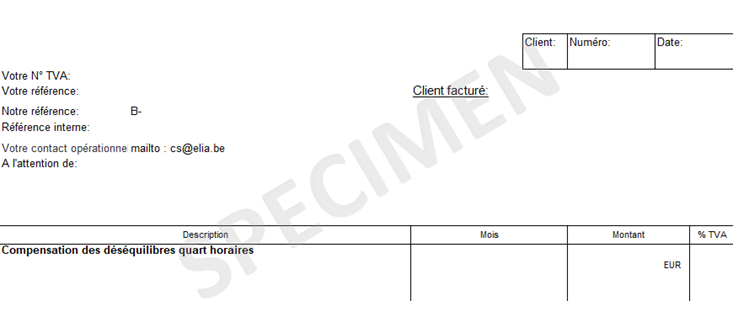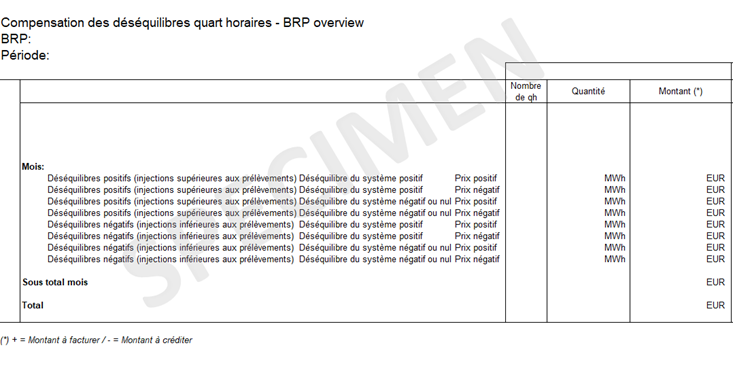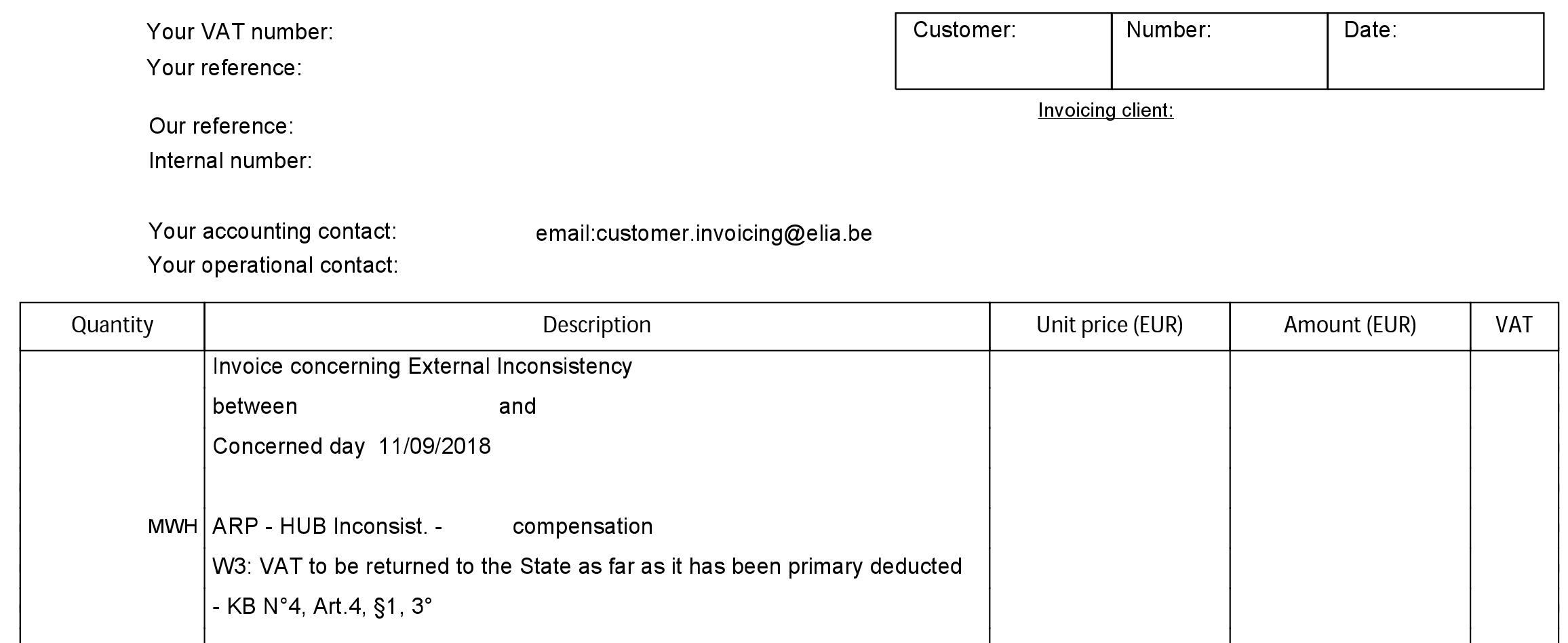Imbalance invoice
Two types of invoices are sent to BRPs: invoices for compensation quarter-hourly imbalances and invoices for external inconsistencies.
Invoices for compensation quarter-hourly imbalances
BRPs can view their invoices with the Customer Hub application. The section on invoicing includes the invoice itself (in PDF format) plus its appendices, allowing BRPs to check their invoices.
BRPs are invoiced an imbalance tariff for any imbalance found in their balance area. This is done on a quarter-hourly basis. This 'tariff for maintaining and restoring the individual balance of balancing responsible party is calculated based on the balancing price applying at that time.
The imbalance invoice may be a credit note or an actual invoice. A BRP will thus be invoiced or reimbursed depending on the contribution it has made to reducing the overall imbalance in the control area (by managing the imbalance in its own perimeter). An appendix to the invoice indicates the amount credited to the BRP or the amount the BRP owes Elia. Full details of how the quarter-hourly imbalance was calculated are available through the metering information tool EVMS.
Sample invoice for compensation quarter-hourly imbalances

Sample appendix to invoice for compensation quarter-hourly imbalances

Invoice for external inconsistencies
If BRPs’ nominations are not balanced, an external inconsistency occurs. Elia will then charge the BRPs the imbalance tariff as per the provisions of Appendix 8 to the BRP contract, and a separate invoice will be issued for external inconsistencies.
Sample invoice for external inconsistencies

Contact
Invoice legend
-
Contract reference number
This is the reference number of the BRP contract signed with Elia. In the event of a pooling agreement between a number of BRPs, the invoice is sent to the BRP who is responsible for the pool.
-
Credit note
The imbalance invoice may be either a credit note or an actual invoice. A BRP will thus be invoiced or reimbursed depending on the contribution it has made to reducing the overall imbalance in the control area (by managing the imbalance in its own perimeter).
-
Compensation quarter-hourly imbalances
The BRP is responsible for maintaining, on a quarter-hourly basis, the balance between all injections and all offtakes of grid users for whom it is the access responsible party. If Elia detects an imbalance, it applies the imbalance tariff for that quarter-hour.
The pulses given off by the Elia meters supplied to grid users may make it easier for BRPs to manage grid users’ balance.
-
Month
This indicates the month in which the BRP imbalances referred to in the invoice were detected.
The invoice relates to imbalances that occurred two months previously, following validation of the data received from the distribution system operators. Elia may also send a final adjustment invoice once a year, after receiving all the validated data from the operators of every grid on which the BRP operates.
-
Amount
This is the amount invoiced or credited by Elia.
A quarter-hourly breakdown of the amounts is provided in the appendix to the invoice.
This breakdown can also be found in the Invoice Viewer (see the Customer Hub).
-
VATIf the BRP is not based in Belgium, the amount of VAT payable may be €0. If the BRP is based in Belgium, VAT will be payable at a rate of 21%.
-
Compensation quarter-hourly imbalances – BRP overview
One appendix to the invoice lists the eight potential imbalance positions for each quarter-hour, consolidated for the month of the invoice. A second appendix indicates the BRP’s position for each quarter-hour of the month in question.
A positive imbalance occurs in the event of a surplus injection of energy by the BRP. When the price is positive, the tariff applying to this type of situation is an amount payable by Elia to the BRP, and when the price is negative, the tariff is an amount payable by the BRP to Elia. Conversely, a negative imbalance occurs in the event of a deficit injection of energy by the BRP When the price is positive, the tariff applying to this type of situation is an amount payable by the BRP to Elia, and when the price is negative, the tariff is an amount payable by Elia to the BRP.
More about determining the tariff based on the BRP’s position
-
Number of quarter-hoursThis is the total number of quarter-hours in the month when the BRP had a given imbalance profile vis-à-vis the NRV.
-
QuantityThis is the BRP’s total energy imbalance in MWh.
-
AmountThis is the amount obtained by multiplying the volume of the imbalance by the imbalance price set for each quarter-hour. If the amount is positive, Elia invoices the BRP for it, while if it is negative, it is credited to the BRP by Elia.
-
Net upward/downward regulation
This refers to the net regulation volume (NRV), which is defined on a quarter-hourly basis. It is calculated by taking, for each interval, the difference between the sum of the volumes of all upward regulations and the sum of all downward regulations (including any exchanges through the International Grid Control Cooperation requested by Elia with a view to maintaining the balance of the control area).
-
Month
This indicates the month in which the BRP imbalances referred to in the invoice were detected.
The invoice relates to imbalances that occurred two months previously, following validation of the data received from the distribution system operators. Elia may also send a final adjustment invoice once a year, after receiving all the validated data from the operators of every grid on which the BRP operates.
-
Positive/negative price
This is the price of the activations requested by Elia to control the balance of the area on a quarter-hourly basis. It may be positive or negative, taking account of the marginal price of upward regulations (marginal incremental price (MIP)) and the marginal price of downward regulations (marginal decremental price (MDP)).
-
Positive/negative imbalances
This is the BRP’s imbalance position compared with the net regulation volume (NRV) of the Belgian control area. A second detailed appendix indicates the BRP’s position for each quarter-hour of the month in question.
The BRP’s position takes into account the volume of losses for the BRP’s volume of activity at federal level, based on the applicable coefficients.
Adding together all the positions of all the BRPs operating on the Belgian market yields the instantaneous system imbalance (SI) that needs to be corrected by Elia.


